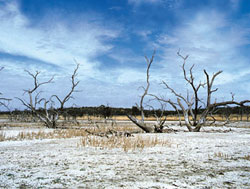|
Expert advises utilisation of saline and sodic lands
HYDERABAD (January 07 2003) : Considering the increasing
demand for food, fuel, and fibre for the increasing
population, it would not be advisable to leave saline and
sodic lands unutilised. Dr S M Alam of Nuclear Institute of
Agriculture Tando Jam stated this while talking to Business
Recorder. stated this while talking to Business
Recorder.
He said according to soil survey of Pakistan in Sindh, the total salt affected area is about 6.3 million acres out of which about 3.8 million is in area commanded by canals. Reclamation of these lands would require extensive drainage system, which is a costly affair to eliminate the twin menace of water logging and salinity. The other option of chemical amendment can work only in soil where possibility of leaching exists.
He said, the scientists of the country had worked out a system, which allows a profitable utilisation of such land, for raising livestock and also utilisation of bio-mass produced for conservation into methane and alcohol, which can be utilised as a source of energy.
He said that the process involves growing of kallar grass, which is highly tolerant and can be grown on saline and sodic soils under brackish water irrigation. The grass yields 3-4 tonnes of dry matter without fertilisation. This grass can either be used as fodder for animals or source of energy. He said, for reclamation it could be ploughed back.
The decomposition into the soil organic matter crates sufficiently acidic conditions to dissolve calcium carbonate and thus decrease the soil salinity. This is followed by Sesbania aculeata as a secondary coloniser, which in turn is ploughed back. The process improves the soil sufficiently to grow other crops. As the technology has been well established by research scientists, it would not be difficult to adopt in Sindh on the saline lands.
He said, in view of world wide problem of saline and sodic land a large number of trees, grasses have been screened for their salt tolerance, and a number of plants have already shown good prospects for economic exploitation.
Dr Alam said some of the plants include Eucalyptus, Acacia (Kikar), Prosopis (babool), tamarix srticulata and Casuriana, which not only provide timber but also excellent fodder to animals similarly there are number of grasses and other plants including Salicornia. Salicornia a salt loving plant provides edible oil and had been exploited among other countries in Saudi Arabia successfully.
Cereals such as Rice, Hordenm, sorghum can also be cultivated in view of the fact that several research organisations in the country have already developed a mutant from Rice var Pokkali, which is salt tolerant rice. The mutant is early maturing and high yielding than its parent.
Breeders also have a programme to transfer salt resistance genes from Agropyron to wheat under the wide crosses programme.
He said that the forgoing listing of plants that can be grown or that can used in transferring genes indicates tremendous possibilities of utilisation of saline land in the province provided world collection of salt tolerant plant is screened for adaptation to conditions in Sindh by conducting field trials for selected plants as food, fuel and feed fodder and breed economically important plants of the region specially rice, wheat, cotton, barely and sorghum for salt tolerance
According sources NIA has also launched a project to reclaim saline land in lower Sindh.
Courtesy Business Recorder
|
Pakissan.com; Advisory Point
|